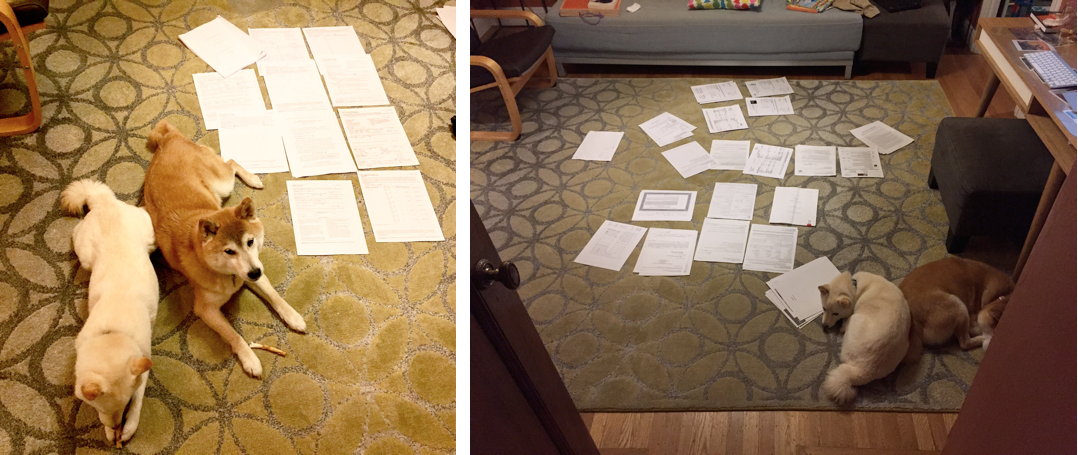ABC. The California Department of Alcoholic Beverage Control. Now here is a government instrumentality that appears to exist solely for the sake of self-perpetuation. Sort of like a virus. Although it's not quite clear what socially useful function ABC is performing, taxpayers can rest assured that whatever the function, it is being performed with maximum inefficiency. Here in the nation of the War on Drugs (sigh), it's no surprise that we have a massive state machinery in place to regulate the sale of alcohol. See also, e.g., Prohibition.
Our purpose seems innocuous enough: to sell beer in a Japanese restaurant. But if you think a short license application and a fee would be enough to make that happen, you are sorely underestimating the capacity of the state bureaucracy to make work for you and, by extension, for itself. I'm laughing right now because I thought I just heard you ask if any of the process can be done online.
The Twelve Labors of Hercules. Roman relief, 3rd century AD. Getting a license to sell beer in the State of California is about as daunting, and probably less pleasant, than cleaning the Augean Stables.
Behold the Bureaucratic Plunder, and Tremble
This process typically starts with a trip to the local ABC office so they can tell you exactly what documents you need to file. This is actually what ABC recommends you do. They realize their scheme is so opaque, complex, random, and unrefined that they need to explain it to you in person. So that's what you're dealing with.
I had the pleasure of a trip to the Oakland ABC office (my first of three). It's up on the 21st floor of a State office building downtown. The waiting room feels just like a doctor's office, except instead of jungle animals and Highlights magazine, there's a huge case of confiscated drug paraphernalia. Cocaine, meth, PCP, pills, tinctures, bongs, scales. The works. All looking especially downcast, like some kind of junkie time capsule that had been filled in 1988 and sealed tight ever since. Naturally, I took a picture.
I dinged a bell and a rather immense and stone-faced man came to the window. I told him I wanted a Type 41 license for On-Sale Beer and Wine. I immediately explained the circumstance that we're a kiosk in a food hall, because you know that's going to throw up about 100 red flags. That being the intermingling of multiple alcohol licenses covering the same space. He told me that I'd either have to license the entire food hall just for Shiba Ramen, or else I'd have to license particular tables for our use. Wait, what? That means either I'm the only tenant in this big place that can serve alcohol, or else I have to find a way to shunt every alcohol-buying customer to a specific table? That just doesn't make any sense.
The same guy (I think) had said the same thing on the phone a few days earlier, when I'd first called for info. So'd I'd done my own research before I went in. Issued alcohol licenses are searchable online, so I looked up the prior Public Market tenants (multiple licenses) and the Westfield in San Francisco (multiple licenses). When I told him that there are currently a bunch of licenses issued at the Westfield, and that they have no seating restrictions, he tried to tell me "well, that's San Francisco." That, of course, is not how things work. This is a matter of State law, not of local municipal fiefdoms.
He obliged me and went and talked to someone deep in the warren of cubicles behind the (bulletproof?) glass. He emerged a changed man, talking good sense and (much to his credit) admitting he'd been wrong about the rules. Now we just had to prepare a map of the food hall interior and mark the areas where we proposed to serve alcohol. Reasonable.
He then pulled out a multi-page checklist of forms and manually checked off every one of over fifteen items items I needed to fill out for the Type 41. It seems we're having a scavenger hunt! Out came a printing calculator, very old school, and he typed up a receipt for all the various fees I'd incur for this application. Just short of $800.
Off I went, forms in hand, pen at the ready! Filling them out turned into some strangely protracted process, inputting the same bits of basic information again and again, page after page. It took hours over several sittings to actually get everything in order, filled out completely. Proudly, I returned in person to ABC (take no chances!) and dropped off my package, and my $800.
This Isn't Even Everything. Submission 1 (left), submission 2 (right) in assembly. With shibas.
You Didn't Think This Was Over, Did You?
About two weeks later, I received a letter from the investigator assigned to our application. Included was another seventeen-item checklist of new forms to fill out and new actions to take. Including posting a notice outside Public Market for 30 days, mailing a letter to every resident within 500 feet (hire a vendor to do this for you), FBI fingerprinting, and giving ABC a ton of financial information: personal bank records and company bank records to demonstrate every dollar of money being invested in Shiba Ramen, corporate resolutions, tax records, share ledgers and stock certificates.
Apparently ABC is terribly, terribly worried about money being laundered through California's restaurant alcohol sales? Or what? Do you realize that ABC needed more detailed financials about us than did our landlord, our lenders, or anybody else in this entire enterprise? Spectacularly invasive and totally over the top. And if the concern is money laundering, has anybody over at ABC (or at the State Assembly, where the laws are made, for that matter) watched Breaking Bad, the show that taught America how to launder money through a car wash?
I ended up spending even more time on the second submission than the first. I returned once again to ABC, said hello to the crack pipes on display in the waiting room, and handed over all sorts of seemingly irrelevant and highly confidential documents to the government.
Finally, after some weeks, I got another letter in the mail. Mercifully, no new checklist. Instead, I was informed that I would need to petition for a "Conditional License," due to an "undue concentration" of alcohol licenses in the relevant census tract. Because issuance of an unrestricted license under these circumstances would be adverse to the "public welfare and morals," extra restrictions must be placed on ours. I'm assuming that it doesn't take much to reach an undue concentration, or to threaten public morals. Emeryville is not some kind of red light district, for pete's sake, nor is it in danger of becoming one any time in the foreseeable future. Anyway, I signed this thing. It seemed pretty much non-negotiable.
Money Laundering. Is a Japanese restaurant really the best way to do this? TV suggests otherwise.
You Didn't Think This Was Over, Did You? Part II
Some time passed after signing the Conditional License petition, but no license arrived. So I called the assigned investigator, who told me that ABC was still waiting for info from me. Strangely (or not), I had never been notified that there were still holes in Shiba Ramen's application. After all this, what in the world could the government still need? Well, it turned out that we hadn't perfectly dotted all the i's in our financial submission. See, one of the things ABC requires you to do is to tell it how much money you're investing in your business, and then prove that you have every penny of whatever figure you provide. Of course, before your business is open, before you've even started construction, you have no idea how much money you're investing, so it's essentially an exercise in pulling a number out of a hat. ABC never verifies the actual amount you invest, mind you, but if you say you're investing $100K, you'd better be able to source $100K.
The problem, of course, is that if your company has been spending money on startup expenses, money that has been invested has been spent, and it isn't sitting placidly in a bank account awaiting inspection by the government. In our case, I think we had $10-20K less in the collective accounts than our stated investment amount. Careful lawyer that I am, I had recognized this problem in advance and had submitted a cover letter with all of our financials, explaining this (completely natural and expected) disparity, and inviting ABC to contact me with questions. Naturally, the cover letter was ignored and I was left to wonder why our application had stalled. The investigator told me to go back and cobble together bank statements from the past year showing the movement of the company's money. Good lord, really? Fortunately I was able to trot out a recently-obtained line of credit and short-circuit the required financial reconstruction. New sources of $$$!
At Last, Beer Is Served
The last box to be checked is the physical inspection by the ABC investigator. Once construction is finished, the investigator came out and took a look. Yep, this is a bona fide Japanese restaurant, not some kind of dubious Albuquerque car wash. Let beer be sold!
And so, a good six months after submitting our initial application, Shiba Ramen was anointed with a Type 41 On-sale Beer & Wine license. We have three draft beers on tap, a permanent stationing of Sapporo, and a rotating selection of Bay Area craft beers. This week, we're featuring outstanding beer from Novato's Baeltane and Berkeley's Fieldwork. Oakland's Linden Street was on tap last week, and will be arriving again soon, and we'll be looking to roll out a keg from Alameda's Faction Brewery in the next few weeks. Over in the fridge, we're serving canned Japanese craft beer, including the super-popular Belgian-style Wednesday's Cat, and sake.
Please come drink.
p.s. This post is not intended to point any fingers at the individual employees of ABC who, after all, are just doing their jobs. The problem with ABC is systemic, policy-driven, and ultimately political.






